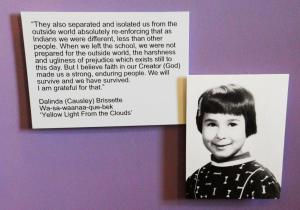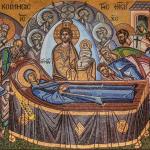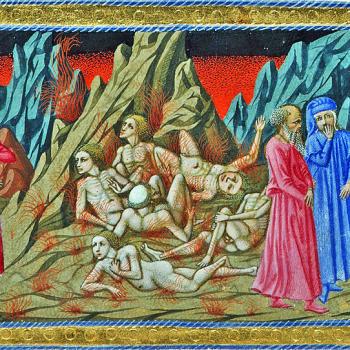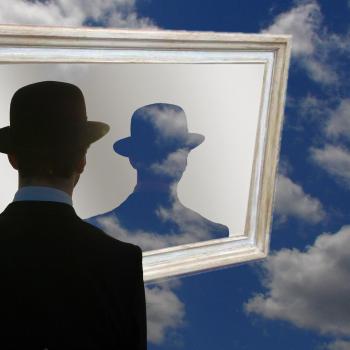
If the ends do not justify the means, then good intentions do not justify bad means. It is true, at its heart, the church, and with it, many of its members had the best of intentions for Native Americans (and other indigenous peoples around the world). The church wanted their salvation. Missionaries, seeking to spread the faith, wanted to save the people they encountered, and they ended up doing so by any means they thought was necessary, which of course meant, they embraced bad means for a good cause. In doing so, they thought they had to destroy Native American cultures if they were to have Native Americans convert to the faith and be saved; in doing so, they went against the church’s tradition established at the Council of Jerusalem which indicated the Gospel was not to be reified in one cultural tradition. Sadly, not all Christians had the best intentions. Many had no care or concern for indigenous peoples, thinking they got in the way of the land they wanted to take over and possess, so that these Christians embraced outright genocide, thinking that wiping out Native populations would be the final solution to their manifest destiny.
Throughout history, there have been Christians, some missionaries, who truly honored and respected Native Americans, who sought to protect and preserve them and their traditions. They resisted secular government and their fellow Christians who tried to wipe out and destroy Native American traditions. Some of them did so only after first joining in with that destruction – that is only after they had seen what they had done and repented of it, such as we can find in the life of Bartolomé de las Casas or Francisco Ximénez. They promoted a defense of the Native Americans and their culture, working to preserve that culture from destruction any way they could. While they were few and far between, their existence was often known by Native Americans and it is why many Native Americans like Red Cloud looked to Catholics, asking if they were to have missionaries in their lands, they would be Catholic missionaries, hoping that their own people and some of their culture could still be preserved. Sadly, even when this happened, it happened only for a short time; those who worked for the preservation of their culture gave way to a new generation which did not hold to such high ideals, which is why Catholic missions would fully embrace the desire to convert Native Americans by destroying their ties to their own cultural heritage. Thankfully, even in the midst of the worst cultural atrocities, there were some Native Americans who tried to keep to and preserve elements of their culture and hand them down while taking up the Christian faith, with the best and most famous example of them being Black Elk. As a result, when secular society decided Native Americans could return to their own cultural traditions, some of them turned their back on the church because they did not feel the church had protected and guarded them properly, while others continued trying to find a way to bridge the two (which can be seen in the way Black Elk’s own family divided along the lines of both traditions).
There is much which can be said of this black mark on Christian history. The atrocities of the church, of Christians and the state as they manipulated and harmed, if not outright destroyed Native American peoples, are too many to count. Every day we hear more and more examples of it. Some Christians truly desired to wipe out the Native Americans, while others wanted only to wipe out their culture. But if Christians had entirely destroyed their culture, the Native Americans would have been effectively be wiped out. The church should have known better. It should have known that there was much to be learned from the Native Americans and their traditions. Thankfully, despite all the good and bad intentions, and all the bad means employed, Christians did not wipe out all the Native Americans, nor all their cultural traditions. But it is also clear, Christians have severely harmed Native American peoples and there is need for restitution. Christians need to listen to the Native Americans and their grievances. Christians need to repent for what they had done and to make sure they do not let things continue as they were. They need to heed what Native Americans have to say and learn from them. Not only do Christians (and secular society as a whole) need to do this to help restore what had been lost, Christians need to do this so as to learn from them what they should have learned when they first encountered Native Americans, for their cultures had many gifts given to them which could have and should have been shared with the rest of the world (and therefore the church).
More Christians are becoming aware of this. They know they must acknowledge their sins and repudiate all the evil done in the name of Christ and the church. Thus, in 2019, Pope Francis said:
Let us say NO, then, to forms of colonialism old and new. Let us say YES to the encounter between peoples and cultures. Blessed are the peacemakers.
Here I wish to bring up an important issue. Some may rightly say, “When the Pope speaks of colonialism, he overlooks certain actions of the Church”. I say this to you with regret: many grave sins were committed against the native peoples of America in the name of God. My predecessors acknowledged this, CELAM, the Council of Latin American Bishops, has said it, and I too wish to say it. Like Saint John Paul II, I ask that the Church – I repeat what he said – “kneel before God and implore forgiveness for the past and present sins of her sons and daughters”. I would also say, and here I wish to be quite clear, as was Saint John Paul II: I humbly ask forgiveness, not only for the offenses of the Church herself, but also for crimes committed against the native peoples during the so-called conquest of America. Together with this request for forgiveness and in order to be just, I also would like us to remember the thousands of priests and bishops who strongly opposed the logic of the sword with the power of the Cross. There was sin, a great deal of it, for which we did not ask pardon. So for this, we ask forgiveness, I ask forgiveness. But here also, where there was sin, great sin, grace abounded through the men and women who defended the rights of indigenous peoples. [1]
But there truly needs to be more than the mere acknowledging the sins of the past. There needs to be more than Christians asking for forgiveness, acting like if they ask, everything goes back to normal. Penance is necessary. Restoring what was unjustly taken from the Native Americans is necessary. Allowing them the freedom which they were not allowed for generations is necessary. Sadly, not all Christians understand this. We still see many with the same old attitudes towards Native Americans, showing little to no concern for their rights. We can see this in the conflict at Mount Graham in Arizona, where the Vatican, along with the state of Arizona, established an observatory on holy Native American grounds, taking over the grounds, making it difficult if not impossible for Native Americans to practice their own religious rites on their own sacred grounds. The Jesuit director of the observatory, who often has done good scientific work, showed no care or concern for the Native Americans whose land was being used and abused:
Mount Graham, the colonial name for Dził Nchaa Si’an, was part of the San Carlos Apache Reservation until 1873, when the federal government seized it by presidential executive order, deeming it public lands and subsequently placing it under the management of the U.S. Forest Service. Access to the mountain, however, fell under the control of the University of Arizona. In 1990, George Coyne, director of the Vatican Observatory in Italy, who was at the time also a professor at the university, broke ground for a new observatory on Mount Graham. Neither the Vatican, the Forest Service, the university, nor any of the observatory’s other collaborators ever sought the Apache people’s approval. Coyne himself was dismissive of the objections that were made.[2]
The struggle between the Vatican, the State of Arizona, and the Native Americans is real. Native Americans have not been allowed to go to their own holy lands and simply pray there. If they want to go, they have to go through a long, and complicated process to get approval. For decades now, Native Americans have made a symbolic gesture against this by doing a protest run up the mountain, protesting the way they have been unjustly removed from their own holy land. 2021 is the thirtieth year of that run. Now, with the observatory, we once again see how some good intentions are being used to justify evil, this time, with the intentions being scientific, not religious. The Catholic Church, the State of Arizona (and so, the United States) are shown to be complicit in continuing the ideologies of the past, ideologies which Pope Francis and others have said need to be put to a stop.
We need to hear more than words, we need more than apologies, we need active engagement with the Native Americans to work for their promotion, not as leaders acting as if we can save them, but as servants, allowing them to take the lead and direct us as we try to work to overcome all the harm done to them in the past. Among that harm is all the damage and destruction done in the reservation boarding school system, which we see, led to mass deaths which need not have taken place. Following through with such a program will not only begin to heal what needs to be healed, it will make us better as we will find ourselves transformed in the way we should have been centuries ago, as we will listen to and learn from the Native Americans instead of thinking only we had something worth teaching. Indeed, by doing this, we will begin by learning possibly one of the most important lessons we can learn from Native American culture, that is, various notions of justice, among which is the notion that people need to take care of the world they live in and preserve it so it can continue for many generations to come. Connected to this principle, and highlighted by the USCCB, is that of restorative justice, a principle which is especially relevant to Western Society as it tried to undue the harm done not only to Native Americans, but others as well:
Although the lives of Native American holy men and women have deeply enhanced Catholic Native American spirituality, Native cultures also provide principles that enrich the rest of American culture. One of these is the principle of restorative justice. Restorative justice has developed from the Native American cultures to challenge how the criminal justice system functions, especially in the transformation of victims, perpetrators and society. Pope Francis has spoken of Native American cultures and how they tend to reverence Creation, show care for the environment, and live in balance within the domains of the natural world.[3]
The crimes against the Native Americans, the destruction of the people and their traditions must be understood and acknowledge as evil. We can recognize that some had some level of good intention, but the means, being evil, means that their actions were not justified. Possibly some tried to undermine genocide by cultural genocide, and we can recognize their intent was better than those who wanted to outright destroy Native Americans. And some truly within the missionary system wanted to embrace Native Americans as they were without destroying them and their culture, which is why some Native Americans embraced them when they came to Native American lands. But the good was few and far between. The bad was systematic. And Christians today must deal with the legacy which was established in their name, a legacy which cries out and demands restitution.
[1] Pope Francis, “Address To The Second World Meeting Of Popular Movements” (7-9-2015).
[2] Molly Peters, “The Apache Community Running to Rescue Its Mountain” in High Country News (8-10-2021).
[3] United States Conference of Catholic Bishops, Two-Rivers: A Report On Catholic Native American Culture and Ministry (Washington, DC: USCCB Publishing, 2019), 25.
Stay in touch! Like A Little Bit of Nothing on Facebook.
If you liked what you read, please consider sharing it with your friends and family!













